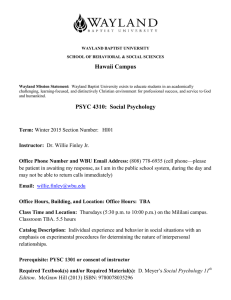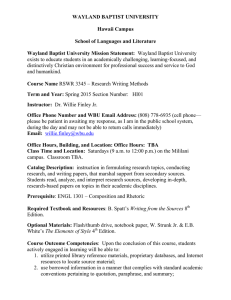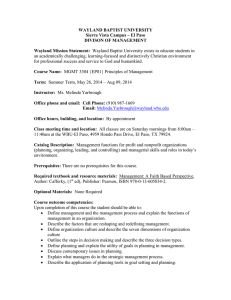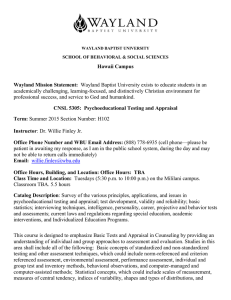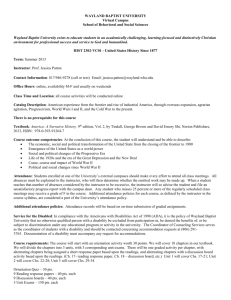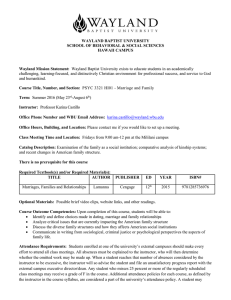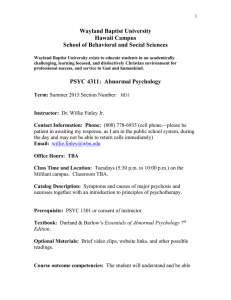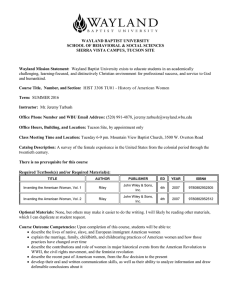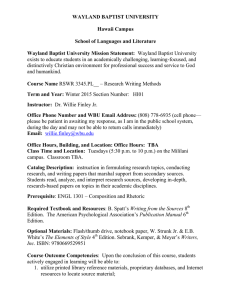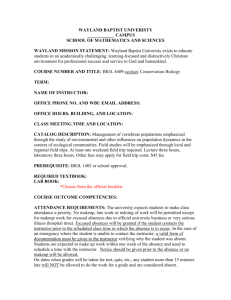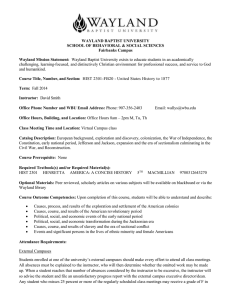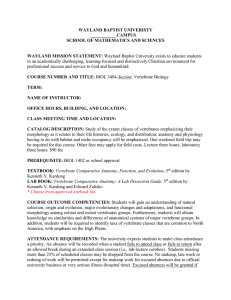Hawaii Campus
advertisement
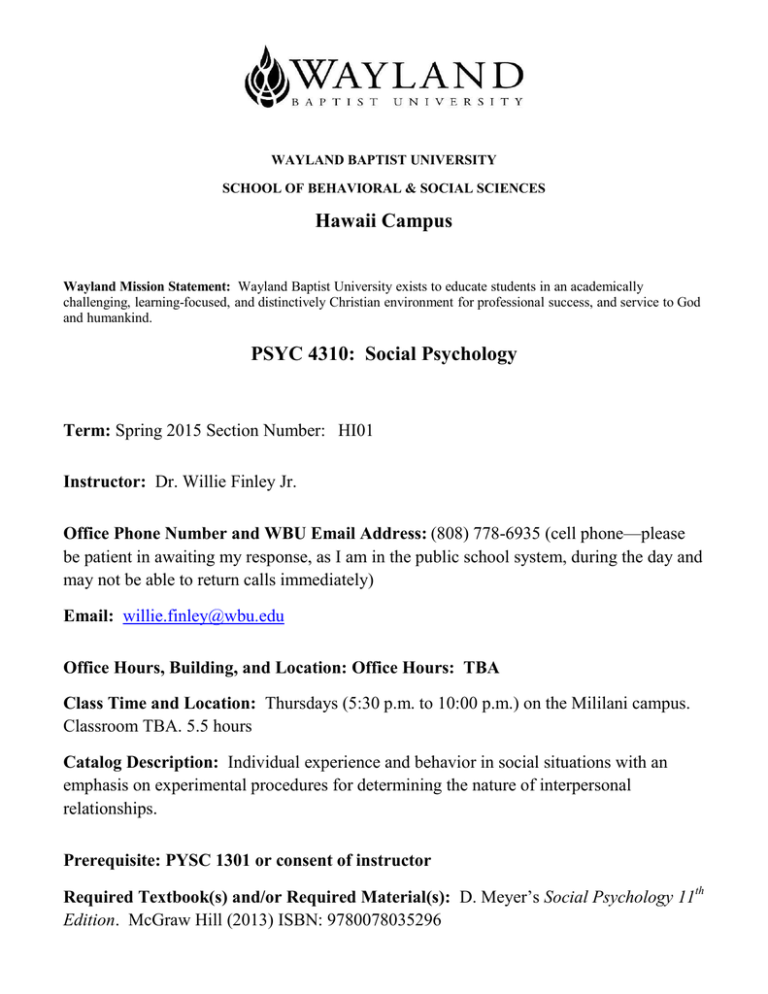
WAYLAND BAPTIST UNIVERSITY SCHOOL OF BEHAVIORAL & SOCIAL SCIENCES Hawaii Campus Wayland Mission Statement: Wayland Baptist University exists to educate students in an academically challenging, learning-focused, and distinctively Christian environment for professional success, and service to God and humankind. PSYC 4310: Social Psychology Term: Spring 2015 Section Number: HI01 Instructor: Dr. Willie Finley Jr. Office Phone Number and WBU Email Address: (808) 778-6935 (cell phone—please be patient in awaiting my response, as I am in the public school system, during the day and may not be able to return calls immediately) Email: willie.finley@wbu.edu Office Hours, Building, and Location: Office Hours: TBA Class Time and Location: Thursdays (5:30 p.m. to 10:00 p.m.) on the Mililani campus. Classroom TBA. 5.5 hours Catalog Description: Individual experience and behavior in social situations with an emphasis on experimental procedures for determining the nature of interpersonal relationships. Prerequisite: PYSC 1301 or consent of instructor Required Textbook(s) and/or Required Material(s): D. Meyer’s Social Psychology 11th Edition. McGraw Hill (2013) ISBN: 9780078035296 Optional Materials: Brief video clips, website links, and other possible readings. Course Outcome Competencies: Upon completion of this course, students will be able to: demonstrate on tests, through class discussion, and in their portfolios critical thinking, by applying social psychological phenomena to movies, books, and other projects as assigned. demonstrate on tests, through class discussion, and in their scholarly papers understanding of the major concepts and theoretical framework of Social Psychology and the empirical research that evaluates these concepts. Attendance Requirements: External Campuses Students enrolled at one of the university’s external campuses should make every effort to attend all class meetings. All absences must be explained to the instructor, who will then determine whether the omitted work may be made up. When a student reaches that number of absences considered by the instructor to be excessive, the instructor will so advise the student and file an unsatisfactory progress report with the external campus executive director/dean. Any student who misses 25 percent or more of the regularly scheduled class meetings may receive a grade of F in the course. Additional attendance policies for each course, as defined by the instructor in the course syllabus, are considered a part of the university’s attendance policy. A student may petition the Academic Council for exceptions to the above stated policies by filing a written request for an appeal to the executive vice president/provost. . Statement on Plagiarism and Academic Dishonesty: Wayland Baptist University observes a zero tolerance policy regarding academic dishonesty. Per university policy as described in the academic catalog, all cases of academic dishonesty will be reported and second offenses will result in suspension from the university. Disability Statement: In compliance with the Americans with Disabilities Act of 1990 (ADA), it is the policy of Wayland Baptist University that no otherwise qualified person with a disability be excluded from participation in, be denied the benefits of, or be subject to discrimination under any educational program or activity in the university. The Coordinator of Counseling Services serves as the coordinator of students with a disability and should be contacted concerning accommodation requests at (806) 291- 3765. Documentation of a disability must accompany any request for accommodations. Course Requirements and Grading Criteria: Students are expected to attend all class sessions; since meeting times are held only once a week, vast material will be covered. If a student is absent—excused or unexcused—it is his/her responsibility to get notes from another classmate. Again, because of the scarcity in meeting times, it is the student’s responsibility to stay on top of the readings. To ensure the student understands the barebones of the readings and lectures, small weekly quizzes will be given either at the end of class or, on some occasions, to be taken home and completed by the students. The quizzes are more application in nature and should not alarm the student, as they only serve as reminders of what he/she might need to further study. Make-ups will not be issued without a valid excuse. Students should type all quiz responses—and bring all hardcopies to class. Later in the semester, the student will write a 5 to 8 page paper on any topic of his/her liking—as long as it is pertinent to social psychology. Such topics are endless! Some possible examples might include: cyberbullying, cults, racial profiling, peer pressure, and personality types. The goal is for the student to select a topic he/she finds appealing. Whatever the topic, the paper must include references for support and use APA format. Furthermore, there will be three tests issued over the course of the semester. The student is encouraged to participate in discussions, take notes (if need be), and be punctual. The University has a standard grade scale: As stated above, the bulk of the course will consist of three exams, a short paper, quizzes, and regular attendance/participation. The University has a standard grade scale: A = 90-100, B = 80-89, C = 70-79, D = 60-69, F= below 60, W = Withdrawal, WP = withdrew passing, WF = withdrew failing, I = incomplete. An incomplete may be given within the last two weeks of a long term or within the last two days of a microterm to a student who is passing, but has not completed a term paper, examination, or other required work for reasons beyond the student’s control. A grade of “incomplete” is changed if the work required is completed prior to the last day of the next long (10 to 15 weeks) term, unless the instructor designates an earlier date for completion. If the work is not completed by the appropriate date, the I is converted to an F. Student grade appeals: Students shall have protection through orderly procedures against prejudices or capricious academic evaluation. A student who believes that he or she has not been held to realistic academic standards, just evaluation procedures, or appropriate grading, may appeal the final grade given in the course by using the student grade appeal process described in the Academic Catalog. Appeals may not be made for advanced placement examinations or course bypass examinations. Appeals limited to the final course grade, which may be upheld, raised, or lowered at any stage of the appeal process. Any recommendation to lower a course grade must be submitted through the Executive Vice President/Provost to the Faculty Assembly Grade Appeals Committee for review and approval. The Faculty Assembly Grade Appeals Committee may instruct that the course grade be upheld, raised, or lowered to a more proper evaluation. Tentative Schedule (subject to change!): Week 1 (2/26): Orientation; Chapters 1 and 2 Week 2 (3/5): Quiz 1; Chapters 3 and 4 Week 3 (3/12): Continued/Review Spring Break (3/19): No Class Week 4 (3/26): Exam I Week 5 (4/2): Chapters 6, 7, and 8 (Quiz 2) Week 6 (4/9): Continued/Review (Quiz 3) Week 7 (4/16): Continued/Review Week 8 (4/23): Exam II Week 9 (4/30): Chapters 9, 10, 11; Quiz 4 Week 10 (5/7): Continued; Quiz 5; Papers due/Review(Tie-up any loose ends) Week 11 (5/14): Exam III Additional Information: Important Notes: Again, be aware that this is a tentative schedule. If the class needs to spend more time on an interesting topic, adjustments may be made. Also please be sure to read any and all announcements on the quizzes. The method of grade determination will be via the following point system: Class Participation: 50 pts Attendance: 100 pts Quizzes (20 pts a piece): 100 pts Exams (3 total): 450 pts Paper: 300 pts As a result, here is the class grading scale (mirroring the University’s): 900-1000= A 800-899=B 700-799=C 600-699=D 599-Below=F http://catalog.wbu.edu
